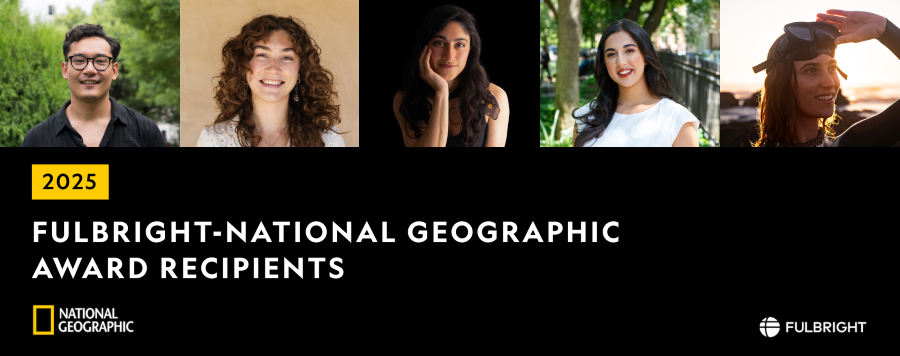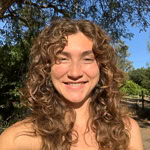
Now in its 12th year, the Fulbright-National Geographic Award Program supports projects that communicate powerful narratives that foster global understanding and peace, amplified through the networks of both the Fulbright Program and the National Geographic Society. These Fulbright U.S. Student award recipients join a global community of Explorers, gaining lifelong professional development through Society-offered trainings, events, and public engagement opportunities. Chosen through a highly competitive process, recipients carry out their projects using various research and storytelling methods.
The five newly named Fulbrighters and National Geographic Explorers will embark on projects around the world that engage local communities and support the conservation of our planet’s lands and oceans, from the Arctic soundscape to vital aquatic and terrestrial habitats, with the goal of building a better future.
Their projects include researching the relationship between Ophiocordyceps fungi and “zombie ants” in Malaysia with the potential for discovering new antimicrobials; and an ethnographic study of Indigenous porters in Nepal’s trekking industry.
“The unique cultural heritage of our community in Nepal offers an authentic experience for tourists, and we want to be key partners in sharing it with the world,” said Explorer Amrit Tamang. “Our community is dedicated to sustainable tourism, and we want to ensure our traditional practices are respected and integrated into any new developments.”
Other projects will focus on developing geospatial mapping tools to support community mobility needs through electric vehicle infrastructure in the Azores, investigating the future of Tanzania’s sea cucumber economy, and researching Arctic marine soundscapes in Canada.
“Sea cucumbers are one of the most highly prized and valuable fisheries in the world,” said National Geographic Explorer Taylor Bratton. “Through portrait photography, I hope to tell the story of harvesting sea cucumbers and its connection to international trade through the perspective of the women who fish for them.”
Meet the 2025 Fulbright-National Geographic Award recipients:

Amrit Tamang; Cultural Anthropologist; Nepal
Amrit Tamang will conduct an ethnographic study of the labor and migration experiences of Indigenous Tamang porters in Nepal’s trekking industry. His project will describe the contributions and historical realities of these porters, who form the backbone of the industry. Tamang, himself the son of a porter, seeks to bridge academic research and policy with porters’ narratives, photographs, and short videos that describe their vital role in Nepali tourism.

Katie Vyhnal; Mycologist; Malaysia
Katie Vyhnal will research parasitic Ophiocordyceps fungi and their ant hosts, commonly known as “zombie ants.” Her research will involve field expeditions to Mulu National Park to collect specimens, identify both ant and fungal species, and determine if a dominant host species exists. Vyhnal’s research holds potential for discovering new antimicrobial agents from these fungi, contributing to future medical advancements.

Priya Talreja; Urban Planner; Azores, Portugal
Priya Talreja will focus on developing electric vehicle (EV) infrastructure in the Azores islands of Portugal. Her project will develop a geospatial mapping tool to identify optimal EV charger locations. Talreja will collaborate with policymakers and community members to develop strategies for EV access that can be exported to other places in the world.

Taylor Bratton; Marine Conservationist; Tanzania
Taylor Bratton will investigate the future of Tanzania’s sea cucumber economy, focusing on the impacts of recent CITES (Convention on International Trade of Endangered Species) listings on local livelihoods and trade. Her project will combine research with photo-based storytelling to document how these new regulations reshape local dynamics. Bratton will also explore Tanzania’s pioneering solutions in sea cucumber aquaculture, particularly how new opportunities are benefiting women in coastal communities.

Kyrin Pollock; Arctic Marine Soundscape Researcher; Canada
Kyrin Pollock’s research focuses on the Arctic’s wild soundscape and how it is affected by the increasing industrial noise of propellers, engines, seismic airgun blasts, drilling, and oil and gas exploration. Her work aims to integrate Inuvialuit knowledge with marine conservation to address the impacts of noise on marine life, especially bowhead whales. She will co-develop a participatory course with the Olokhaktomiut Hunters and Trappers Committee (OHTC) in Ulukhaktok.
About the Fulbright-National Geographic Award
Fulbright-National Geographic Award recipients conduct projects across research, conservation, technology, education and storytelling in their respective host countries. In addition to their award funding, recipients will join a global community of Explorers and continue their lifelong professional development through trainings, events and public engagement opportunities offered by the Society. Chosen through a merit-based and highly competitive process, recipients will utilize a variety of research methods and storytelling tools to carry out their project with support and mentorship from both the Fulbright Program and fellow Explorers. Each of these projects intersect and are united in their goal to communicate powerful narratives that mobilize global communities, create mutual understanding and build a more peaceful world.
About the Fulbright Program
The Fulbright Program is the U.S. Department of State’s flagship international educational exchange program. Since its inception in 1946, the Fulbright Program has provided nearly 450,000 accomplished students, scholars, artists, and professionals of all backgrounds and fields the opportunity to study, teach, and conduct research, exchange ideas, and contribute to finding solutions to complex global challenges. The Fulbright-National Geographic Award launched in 2013 as a partnership between the U.S. Department of State and the National Geographic Society.
To find out more about the Fulbright U.S. Student Program Study/Research Award and the additional funding provided through the Fulbright-National Geographic Award, visit U.S. Fulbright Program – Study/Research Awards.
About National Geographic Society
The National Geographic Society is a global nonprofit organization that uses the power of science, exploration, education and storytelling to illuminate and protect the wonder of our world. Since 1888, National Geographic has pushed the boundaries of exploration, investing in bold people and transformative ideas, providing more than 15,000 grants for work across all seven continents, reaching 3 million students each year through education offerings, and engaging audiences around the globe through signature experiences, stories and content.